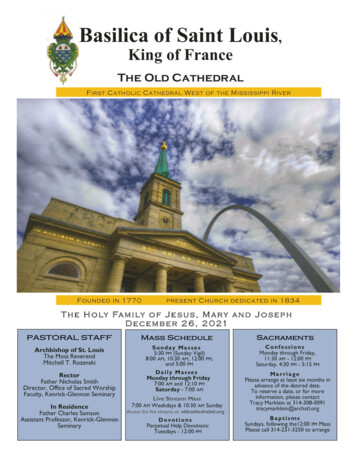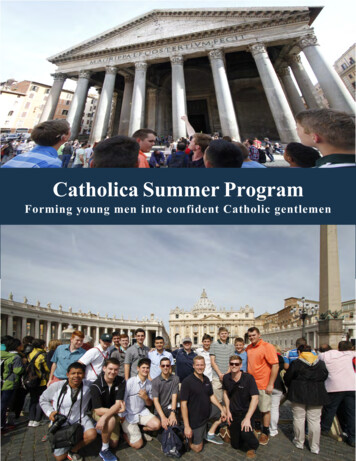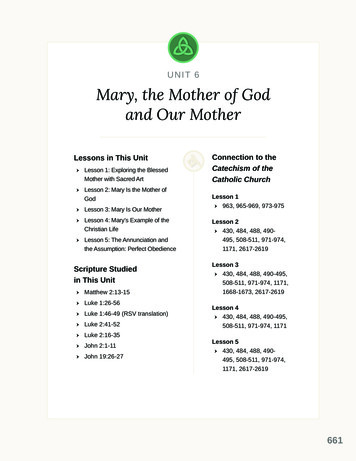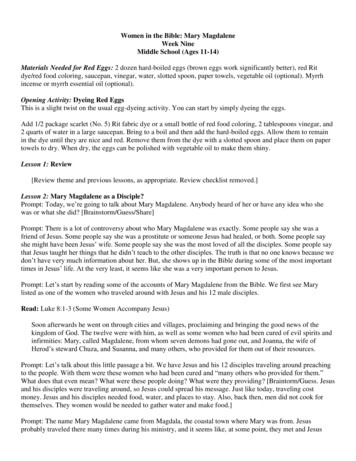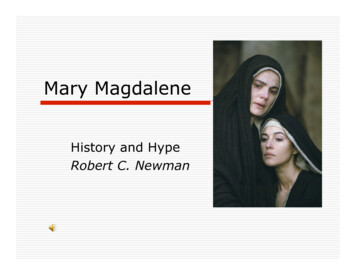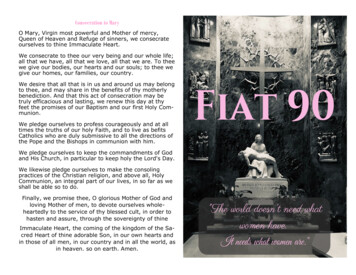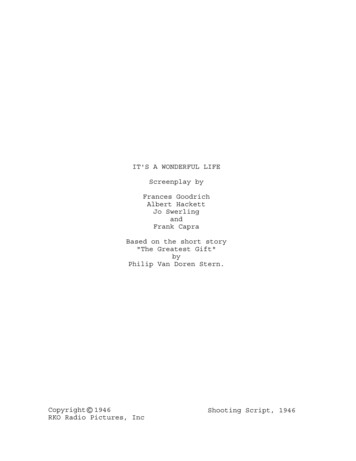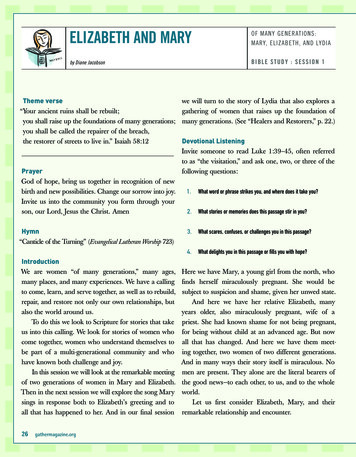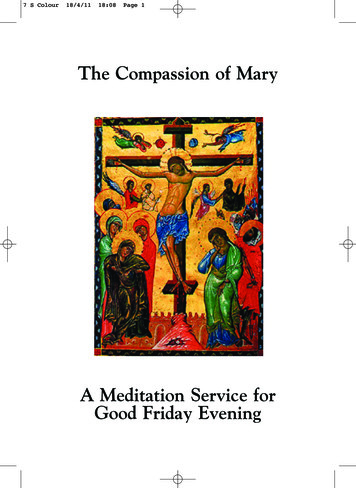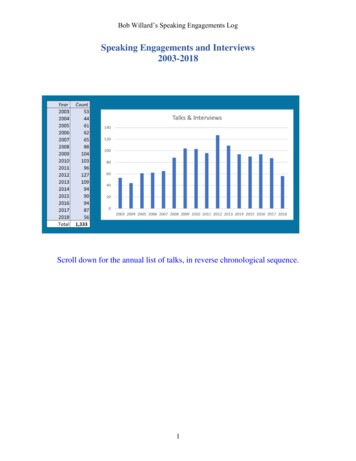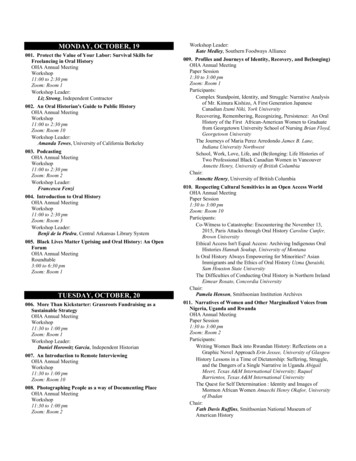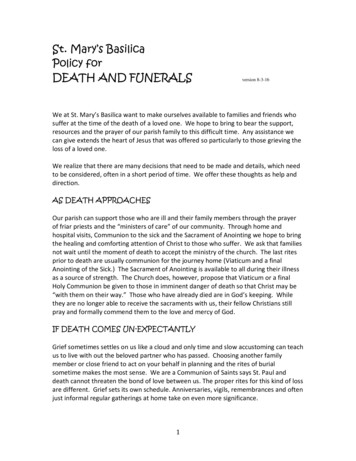
Transcription
St. Mary’s BasilicaPolicy forDEATH AND FUNERALSversion 8-3-16We at St. Mary’s Basilica want to make ourselves available to families and friends whosuffer at the time of the death of a loved one. We hope to bring to bear the support,resources and the prayer of our parish family to this difficult time. Any assistance wecan give extends the heart of Jesus that was offered so particularly to those grieving theloss of a loved one.We realize that there are many decisions that need to be made and details, which needto be considered, often in a short period of time. We offer these thoughts as help anddirection.AS DEATH APPROACHESOur parish can support those who are ill and their family members through the prayerof friar priests and the “ministers of care” of our community. Through home andhospital visits, Communion to the sick and the Sacrament of Anointing we hope to bringthe healing and comforting attention of Christ to those who suffer. We ask that familiesnot wait until the moment of death to accept the ministry of the church. The last ritesprior to death are usually communion for the journey home (Viaticum and a finalAnointing of the Sick.) The Sacrament of Anointing is available to all during their illnessas a source of strength. The Church does, however, propose that Viaticum or a finalHoly Communion be given to those in imminent danger of death so that Christ may be“with them on their way.” Those who have already died are in God’s keeping. Whilethey are no longer able to receive the sacraments with us, their fellow Christians stillpray and formally commend them to the love and mercy of God.IF DEATH COMES UN-EXPECTANTLYGrief sometimes settles on us like a cloud and only time and slow accustoming can teachus to live with out the beloved partner who has passed. Choosing another familymember or close friend to act on your behalf in planning and the rites of burialsometime makes the most sense. We are a Communion of Saints says St. Paul anddeath cannot threaten the bond of love between us. The proper rites for this kind of lossare different. Grief sets its own schedule. Anniversaries, vigils, remembrances and oftenjust informal regular gatherings at home take on even more significance.1
SCHEDULING FUNERAL SERVICESWe do not direct families to any specific funeral director in the Phoenix area. We have,however, shared with many of these community businesses our policies and the serviceswe are able to provide.We would like to be informed at the parish when a member dies and we would like tomeet the family to offer support and to extend assistance in planning for funerals.Requests can normally be directed to any of the friar priests and parish manager. It willbe important to determine a time for services so that notices can be published in thenewspaper. It will be necessary to discuss with the pastor or pastoral minister timesavailable for such things as wake services, funeral Masses and burial arrangements. Werecommend our own Diocesan Catholic Cemeteries particularly St Francis Cemeterywhich our parish purchased in the early years of its history for burial.WAKES AND VIGIL SERVICESIn planning the events leading to a funeral, it is important to allow time for family andfriends of the deceased to gather for prayer and support. Sundays and Mondays aredifficult days to schedule a Vigil and Funeral due to a set schedule of events, but everyattempt will be made to accommodate a family. A vigil and reception of guests can takeplace in a mortuary, or at the church itself the night before a funeral mass. Our securityis adequate to keep the body of a deceased loved one in our Church overnight.Scheduled use of the church for other services or events would need to be considered.An hour viewing and prayer service is often requested in the basilica prior to the funeralMass. The family can lead a rosary or prayer service themselves or request leadership byone of our pastoral staff. The body is normally greeted by the priest or deaconcelebrant at the door of the church with a sprinkling with water from the Baptismal fontand the dressing of the coffin with the white pall. Normally the large paschal candle,blessed each year in our Easter vigil, is burning near by.As part of a wake, people often gather for a rosary and/or vigil service the night beforethe funeral. The family can best determine the manner in which visitation will takeplace as well as its duration. It is a time for prayer, storytelling, scripture reading, songs,and remembering. A priest deacon or other pastoral minister can lead all or part of thevigil service. Families sometimes have their own funeral traditions and rosary prayerleaders that we want to honor. The Rite of Christian Funerals (the official translation ofRoman Catholic Prayer texts for the United States) provides prayers, Scripturesuggestions and blessings for a Vigil.2
THE FUNERAL MASSThe Mass of Christian Burial is an opportunity to express deep feelings of love andsorrow, but also and opportunity for Christian believers to affirm their trust and faith inthe Paschal mystery, “Christ has died, Christ has risen, Christ will come again!”Our celebration of the Eucharist is our strongest statement that Christ contradicts thedeath we experience. It is the greatest challenge for the Christian to trust the Lord’spromise that even “in the valley of darkness,” The Risen Christ is still with us.Without denying our emotions at this difficult time, our church invites us to express ourfaith in an act of worship. We must ask ourselves if the service we plan for our lovedones express the hope and faith to which (we and they) are called. As members of theChurch, we believe that we have membership in a larger family - the household of faithand the Communion of Saints. For this reason, we stress the importance of bringing theremains of the deceased to the church for the funeral liturgy, even if cremation is tofollow. It is the church building that is the place of the catholic community’s celebration.There we gather for Baptism and the other sacraments of the church’s life.An evening Funeral Mass can most often accommodate the largest number of friendsand family members. A reception can be arranged afterward with burial the followingmorning. Morning Funerals followed by burial is the preference of most. Our Chapelcan accommodate up to 30 people, for a more intimate worship service. The mainBasilica seats around 800 comfortably and is wheel chair accessible for the elderly orhandicapped. It is our hope that as many neighbors and parish members as possiblecan join the family of the deceased in prayer.Time can be made after Communion for a family member to give a brief remembranceand invitation to funeral reception or banquet. The better time for a quality Eulogy isduring the wake or vigil. The role of the funeral homily is to remember the deceased inthe mystery of the Lord’s death and resurrection which is the reason for our hope.MUSIC AND THE FUNERAL MASSThe Funeral Mass is an expression of faith of the Christian community and includescommunity participation in song. The assembly is invited to join in those parts of theMass sung at Sunday liturgies - the psalms, Holy, Holy, etc. - and a number of othersongs. The parish hymnal and other liturgical books can be consulted as a basicresource for worship. We at St. Mary’s provide a worship aid for each funeral.St. Marys’ parish music resources are normally arranged by the director of music andthe individual priest celebrant. Our music director and organist, Gordon Stevenson. Is3
available to plan music with the families in anticipation of a funeral. His fee is normally 200.00 (if organist cantor’s and plays) otherwise 185.00. The cantor’s suggestedoffering is 150.00. Outside organists choirs and musicians are hosted under hissupervision. Special music requests are encouraged by our cantors and organists.Music at funerals is the policy of St. Mary’s Basilica and other arrangements can bearranged should these fees be a burden.It is important that the music expresses our common faith in God and resurrection life.Religious music is preferred but there is room often after the Communion of the Massfor music that may have some personal significance. The Wake or Vigil service is theappropriate place for broader (and more secular) music selections.BURIAL & CREMATIONThe Rite of Christian Funerals offers a particular Committal rite with readings, psalmsand prayers at the graveside or crypt. It is tradition of Roman Catholics that the remainsof our beloved dead be buried in sacred ground. There they can be honored andremembered. Family members are welcome to choose special readings or songs offarewell with a friar priest or deacon presiding. We prefer this to be the priest whocelebrated the Funeral Mass when at all possible. Many cultures have differenttraditions at the burial of a loved one and the priest needs to know in advance so thatthese additional ceremonies can be accommodated, especially military rites. When theCommittal rite concludes, the family is normally presented with a blessed cross inmemory of the loved one. The burial itself has several options: Taking leave of thecoffin in the chapel at the crypt, leaving the coffin at the graveside for later burial orlowering the coffin into the grave or crypt. It is important to know what the familyprefers beforehand. National Flags and military rites are encouraged according tocurrent liturgical custom.The Catholic Church now permits cremation when it is the expressed desire of deceased.Ashes as well need to be honored with burial in a cemetery or placed in a mausoleum,and should not be scattered. The Diocese of Phoenix permits cremains being broughtinto the Church for funerals. We prefer to have a Funeral Mass with the body beforecremation. Some inexpensive packages have been arranged with local mortuaries thathonor this. But should the family chose cremation immediately after death, a localfuneral service, has made available to us an “ark-urn” to carry the container of funeralashes into church, much in the same way as with the coffin. Four pallbearers aresuggested and the baptismal symbols of holy water and funeral pall are used in thesame way as any funeral. Please consult with the priest or other pastoral ministerbeforehand. Allow us to accompany your family as you inter the ashes of your lovedone of our local Catholic cemeteries.FUNERAL RECEPTIONS AND BANQUETS4
Our Basilica parish hall is available for rental for funeral receptions & banquets.Information and fees are available by contacting our parish manager, Jerome Doris atthe Parish Office. These are normally catered and we provide a list of local caterers whoare familiar with our facilities.HONORARIUM FOR THE CHURCHIt is customary to provide an offering of 300.00 to the Basilica at the time of the vigil.This can usually be given to the Funeral director who will forward it to the parish office.Some families like to give the priest, organist or altar servers an additional offering. 250 dollars is suggested for the expenses of the individual celebrant written to the“Franciscan friars” who sponsor St. Mary’s. The parish priests can assist should thesuggested offering is a burden to any family.MEMORIALSMemorial funds are often established to assist a family for funeral expenses. Someprefer to make memorial gifts for the parish or other community. Our parish managercan often assist when this is necessary. We encourage having memorials directed for apurpose that can honor the memory of our loved ones and benefit those who are living.Memorials given to St. Mary’s Basilica, education or parish building fund are mostgracious received. A gift to the Catholic Community Foundation ” of the Diocese ofPhoenix can benefit the growth of resources for our Catholic Schools. The FranciscanFriars of St. Barbara Province offer their “Fraternal Trust Fund” for such gifts. Our wholeBasilica family benefits when St. Mary’s Parish is remembered in a will or through amemorial offering.MASSES IN REMEMBRANCEFamily members who have lost loved ones are held in prayer by the daily liturgy of theHours by the Franciscan friars of St. Mary’s in their friary chapel. Many people requestspecial Masses offered for their deceased. All these requests for Mass intentions arecarefully honored. Arrangements can be made at our parish office and a donation issuggested. Mass stipends usually around 10 dollars go to the local FranciscanCommunity. Our regular Monday through Friday daily Masses are normally available, asare the weekends. Several months advance notice is often needed.We have a special book of prayer intentions in the back of the Basilica for personalprayer requests that our community honors in each weekend Eucharist. PerpetualMasses can be offered through the Franciscan Missionary Union of the Western (O.F.M.)Franciscans. It might be helpful for the family of the deceased when considering howsuch money is to be distributed to plan special days such as an anniversary or birthday5
when a novena or anniversary Mass can be celebrated. We hold the St. Ann Chapelavailable for these special family Masses, which seats about thirty people.Each November 2nd, the Church celebrates “All Souls Day.” We remember in particularthose buried from our Basilica during the past year in that celebration by inscribing theirnames in the “Book of the Dead.” We carry it in procession that day and invite familymembers to join us. The celebration of “Dia De Los Muertos” draws people from allover the Phoenix Area. We normally keep the book displayed in the Basilica near theBaptism font for most of November.Saint Mary’s is the mother Church of Phoenix, and most especially in time of grief andloss. The Basilica is a normally quiet place open each day between 9-4PM. Please be athome here.St. Francis of Assisi left us a beautiful greeting, especially with the nearness of Sisterdeath. It is our wish for you.“THE LORD GIVE YOU PEACE.”The Franciscan Friars and parish staff of St. Mary’s Basilica6
Committal rite concludes, the family is normally presented with a blessed cross in memory of the loved one. The burial itself has several options: Taking leave of the coffin in the chapel at the crypt, leaving the coffin at the graveside for later burial or lowering the coffin into the grave or crypt. It is important to know what the family
